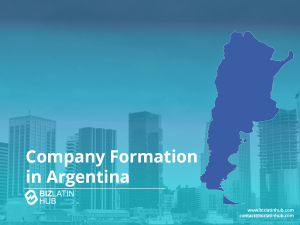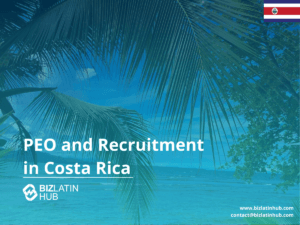Despite being the seventh-largest recipient of foreign direct investment in the world. Entity health checks are used by both large businesses as well as startups before or after company formation in Brazil. Their practicality is especially prudent in nations where corporate compliance regulation is difficult and convoluted, or where penalties for corporate misconduct are harsh. Unfortunately, Brazil qualifies on both of these accounts. With the use of corporate health checks, enter the Brazil market without the fear of non-compliance penalties. This guide explains why a proactive compliance audit is a critical risk management tool in Brazil and details the primary areas of review for any business.
Key Takeaways: Entity Health Check Brazil
| What are the key areas reviewed for a Brazilian company? | Legal compliance checks: Registry filings, corporate governance, statutory requirements Fiscal compliance checks: Tax obligations, social security payments, accounting standards |
| What is a corporate entity health check? | An entity health check is a voluntary audit conducted by independent contractors. |
| Which authorities will a health check look at? | It verifies compliance with the Federal Revenue Service (RFB) and the Board of Trade. |
| Why is a health check particularly important in Brazil? | Brazil is known for having one of the most complex regulatory, tax, and labor systems in the world. A health check ensures all tax and labor obligations are being met correctly. |
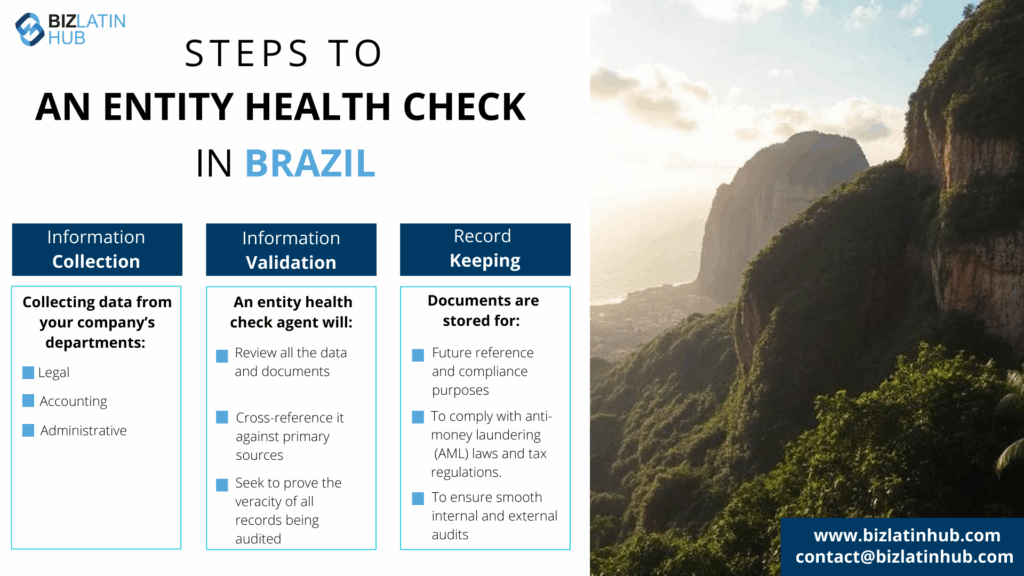
The Importance of a Health Check in Brazil’s Complex Environment
Brazil is known for having one of the most complex regulatory, tax, and labor systems in the world. An entity health check is not just good practice; it is an essential tool for navigating this complexity. It provides a clear snapshot of a company’s compliance status across multiple layers of government, identifying risks before they escalate into major liabilities.
An entity health check is a voluntary audit conducted by independent contractors. This independent group is made up of legal and financial experts who are employed to open up a company to inspect possible compliance issues. By delving into corporate documents, these checks assess the company’s compliance status. Corporate health checks help companies to ensure that their actions are all clean and legal.
Main Areas of a Brazilian Entity Health Check
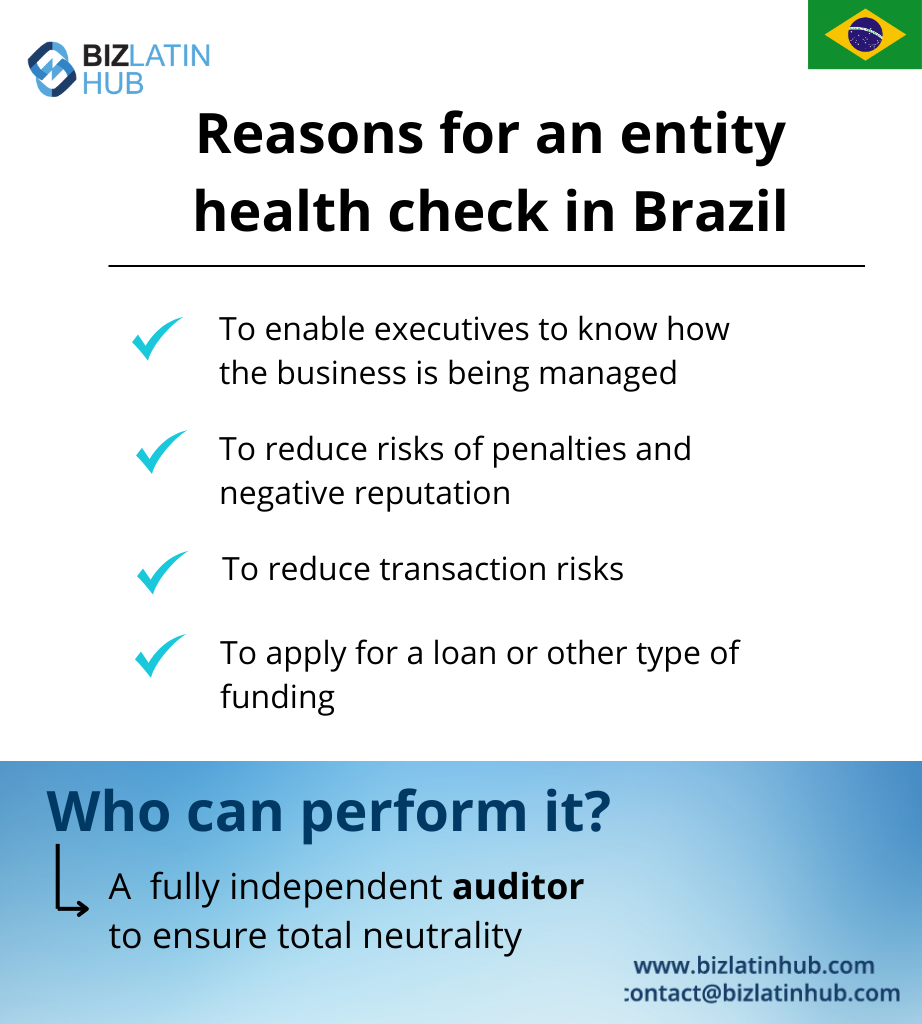
Entity health checks form a critical component of comprehensive due diligence processes in Brazil. While entity health checks focus on ongoing compliance monitoring, legal due diligence encompasses a broader scope of investigation, particularly crucial during mergers and acquisitions or foreign investments.
Expert Tip: Auditing the SPED Filings
From our experience, the most critical area of a health check in Brazil is the verification of the company’s SPED (Public System of Digital Bookkeeping) filings. SPED is a complex digital system through which companies report detailed fiscal, accounting, and labor information to the authorities. There are multiple monthly and annual SPED filings (e.g., ECF for corporate tax, EFD for state taxes). Errors or inconsistencies in these digital files are a major source of tax audits and penalties. A thorough health check must involve a specialized review of the SPED reports to ensure they are accurate, consistent, and have been transmitted correctly.
1. Corporate and Registry Compliance
This audit verifies that the company’s articles of association are properly registered with the state Board of Trade and that all corporate acts are up-to-date.
Legal due diligence examines corporate structure, contractual obligations, intellectual property rights, and regulatory compliance history. When combined with entity health checks, this creates a robust framework for risk assessment that foreign investors require when entering Brazil’s complex business environment.
For companies engaging in business transactions or considering partnerships, conducting both legal due diligence and regular entity health checks ensures comprehensive protection against regulatory penalties while providing transparency to potential stakeholders.
There are two types of corporate health check. One investigates the key areas of legal compliance: registry filings, meeting minutes and statutory registers. The other focuses more on fiscal and accounting compliance by examining the company’s balance sheet.
Health checkers go deep into business transactions, tax payments and employee salaries in order to find issues or gaps in the filings. By doing this, companies can know for certain that they will not incur penalties from authorities.
In compliance landscapes that are dotted with traps and stumbling blocks, it is very easy for companies to overlook certain regulations. Brazil is a prime example of a country with web-like legal and fiscal regulations. Without careful deliberation, penalties and fines can quickly stack up.
2. Federal, State, and Municipal Tax Compliance
This is a multi-layered review of all digital and physical tax filings to ensure compliance with federal (RFB), state (SEFAZ), and municipal tax authorities.
Taxes in Brazil are levied across three different regional levels: federal, state and municipal government taxes. The federal tax is uniform for all; state and municipal tax rates, however, vary across different areas. The city of Manaos, for example, offers a lower rate than somewhere like Sao Paulo.
On gross revenue, companies pay two types of taxes. The first is federal, set at 1.65%. The second is a mandatory social security contribution, set at 7.6%. Businesses must also withhold personal income tax which is deducted from employee’s payment.
There are also two types of value-added tax (VAT) in Brazil. The first tax is a federal payment that is levied on the production and import of domestic and foreign goods. This rate is set at 20%. The second VAT is a state payment on goods as well as services known as ICMS. Dependent on the state this tax rate is set between 7-25%. Brazil’s accounting system plays host to a number of irregularities, outlined is a list of the most profound differences:
- Unlike some countries, Brazil’s tax year is January-December with tax returns required to be filed on the last working day of April.
- It is also worth noting that tax extensions are not offered in Brazil. The deadline is strict and, if missed, fines start to be implemented.
- Companies must report payroll and VAT filings to the Brazilian government every month.
Corporate income tax in Brazil follows a complex structure with rates varying based on company size and profit levels. Standard corporate income tax is levied at 15% on annual profits, with an additional 10% surtax on profits exceeding R$240,000. Companies may elect between actual profit, presumed profit, or simplified taxation regimes, each requiring different compliance procedures that entity health checks must verify.
3. Labor and Social Security Compliance
This review checks compliance with Brazil’s complex labor laws, verifying employment contracts, payroll records, and contributions to social security (INSS) and the employee severance fund (FGTS).
Beyond monthly payroll reporting, Brazilian companies face stringent social security compliance requirements that form a substantial portion of entity health check assessments. The National Institute of Social Security (INSS) mandates detailed monthly contributions for all employees, with specific rates varying by industry sector.
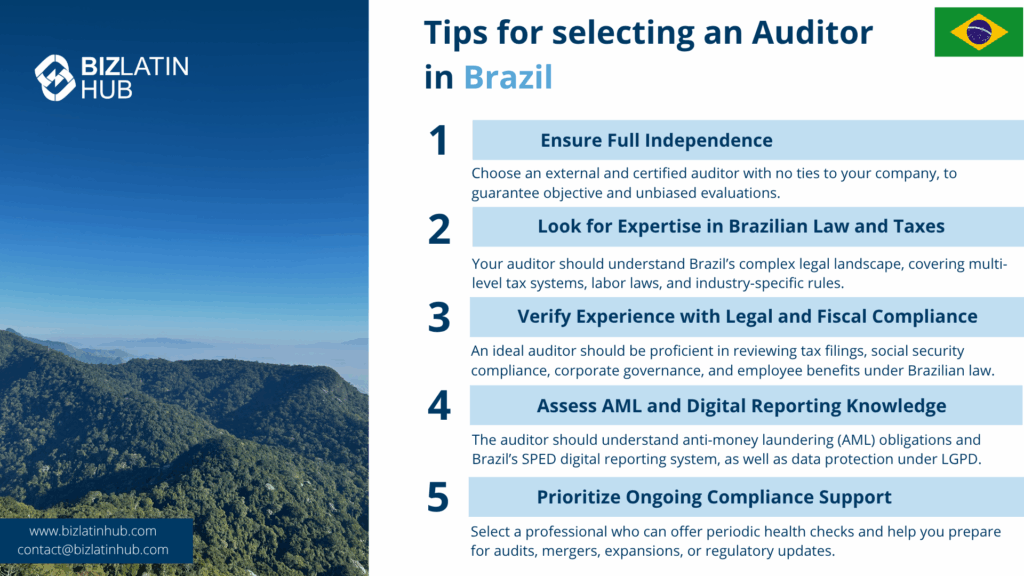
Social Security Payment Requirements
Social security payments include employer contributions ranging from 20% to 28.8% of gross salary, plus additional contributions to the Guarantee Fund for Length of Service (FGTS) at 8% of monthly wages. Non-compliance with social security obligations can result in severe penalties, including business license suspension and criminal liability for company directors.
Entity health checks specifically examine social security payment histories, contribution calculations, and compliance with evolving regulations to ensure companies maintain good standing with Brazilian authorities.
Without the use of local experts to perform an entity health check, non-compliance with any of these fiscal regulations can end up in substantial fines.
4. Central Bank and Financial Compliance
For companies with foreign investment, this check verifies that the investment is correctly registered with the Central Bank of Brazil’s electronic system (RDE-IED).
5. Anti-Money Laundering Compliance Requirements
Brazilian entities must maintain robust anti-money laundering (AML) compliance programs under the oversight of the Financial Activities Control Council (COAF).
Companies are required to implement customer due diligence procedures, maintain transaction monitoring systems, and report suspicious activities to authorities.
Entity health checks examine AML policy implementation, staff training records, and compliance with reporting obligations.
Non-compliance with money laundering prevention requirements can result in severe penalties, including criminal liability for company directors and potential business license revocation.
Why are corporate health checks important in Brazil?
Corporate health checks act as a company’s backstop, saving them from incurring penalties and expensive fines issued by authorities. Particularly in the case of Brazil, it is not an easy task ensuring compliance, even more so for new or foreign businesses not familiar with local law. Corporate health checks are also especially prudent after a set of reforms to corporate law have been made.
For smaller businesses, it can be very easy for these changes to slip past the net. With the help of an entity health checker you can avoid this oversight. Corporate health checks are useful to any business – large or small. Nevertheless, there are three instances where they are most commonly used, during mergers and acquisitions, startups and branch office oversight.
Mergers and Acquisitions
When purchasing another company, a lot of vigilance is required. It is very easy to be distracted by the reams of bureaucracy during a company buyout. What looks ok on the surface can easily be hidden by false figures. By using an independent corporate health checker during a merger, they can investigate the balance sheets in-depth and potentially uncover strings of debt or unpaid taxes.
Mitigating the risk of an incorrect valuation can help purchasers save large sums of money and bring negotiations to a fairer agreement. In the case of Brazil where the web of corporate law is particularly dense, a thorough and diligent examination of a company is wise before a purchase.
Startups in Brazil
In the case of startups, particularly foreign-owned startups where local law is completely alien, it can be very easy for compliance regulation to overwhelm a small office. When there are countless other tasks to complete during company incorporation, it is very easy for compliance to be put to the bottom of the pile. In Brazil, where there is no leeway for non-compliance, fines can bring a startup to its knees before it has even had a chance to grow.
The act of an entity health checker coming in will advise on regulations the company is at risk of breaching or assure a business owner that his company is compliant. The road to company incorporation in Brazil is not an easy one. Bringing on all the support available will help keep the company afloat until it can support itself.
Branch office managment
As a large company with a number of branches around the world, it can be difficult to oversee all of their actions. Compounded by the fact that each branch is likely to have different laws, it is difficult for the corporate managers to keep track of each specific branch’s compliance.
To ensure performance as well as compliance, corporate health checkers can examine the conduct of branch offices and report to head offices for detailed rundowns of operations. Non-compliance can cost the company in fines, sanctions and/or a damaged business reputation. A branch office in Brazil, as many multinational companies have, can mean compliance headaches. The best method of avoiding this is to employ a corporate health checker.
Frequently Asked Questions: Entity Health Check in Brazil
Why should you get an entity health check in Brazil?
An entity health check in Brazil helps executives monitor compliance, avoid steep tax penalties, safeguard corporate reputation, prepare for transactions, and protect directors from personal liability.
What are the typical costs of non-compliance in Brazil?
Non-compliance can lead to tax fines of 75% to 225%, employment law penalties up to R$500,000, social security penalties of 20% to 40%, late filing fines up to R$50,000, and digital system penalties starting at R$1,000 per month.
How often should companies conduct entity health checks?
New companies should perform monthly checks initially, then quarterly. Established firms typically conduct checks semi-annually, while high-risk industries require quarterly reviews. Major transactions or regulatory changes also warrant immediate checks.
Which Brazilian authorities oversee entity compliance?
Entity compliance is overseen by Receita Federal, Labor Ministry, Central Bank, state tax and environmental agencies, municipal licensing authorities, INSS, Junta Comercial, and sector-specific regulators like ANVISA and ANATEL.
What steps are involved in a comprehensive entity health check?
The process includes: (1) Information collection from financial, legal, and HR departments; (2) Validation of records through government databases and portals; and (3) Reporting with risk assessment, recommendations, and a corrective action plan.
What specific areas does an entity health check examine?
An entity health check reviews tax obligations, social security contributions, employment law compliance, corporate governance, third-party contracts, and digital filing requirements through Brazil’s SPED system.
What is a CND?
A CND (Certidão Negativa de Débitos) is a Certificate of No Debts. It is a clearance certificate issued by a government body (e.g., the RFB) that proves a company has no outstanding debts. These certificates are required for almost all major business transactions, and a company cannot obtain them if it is non-compliant.
What is the RFB?
The RFB (Receita Federal do Brasil) is the Federal Revenue Service of Brazil, the national tax authority responsible for collecting federal taxes like corporate income tax and social contributions.
What is the Board of Trade?
The Board of Trade (Junta Comercial) is the state-level government body where companies are registered. A health check verifies that the company’s articles of association and any amendments are correctly filed.
What makes Brazil’s tax system so complex?
Brazil’s tax system is complex because taxes are levied at three levels: federal, state, and municipal. A business must comply with different obligations for each level, including different types of taxes and filing requirements.
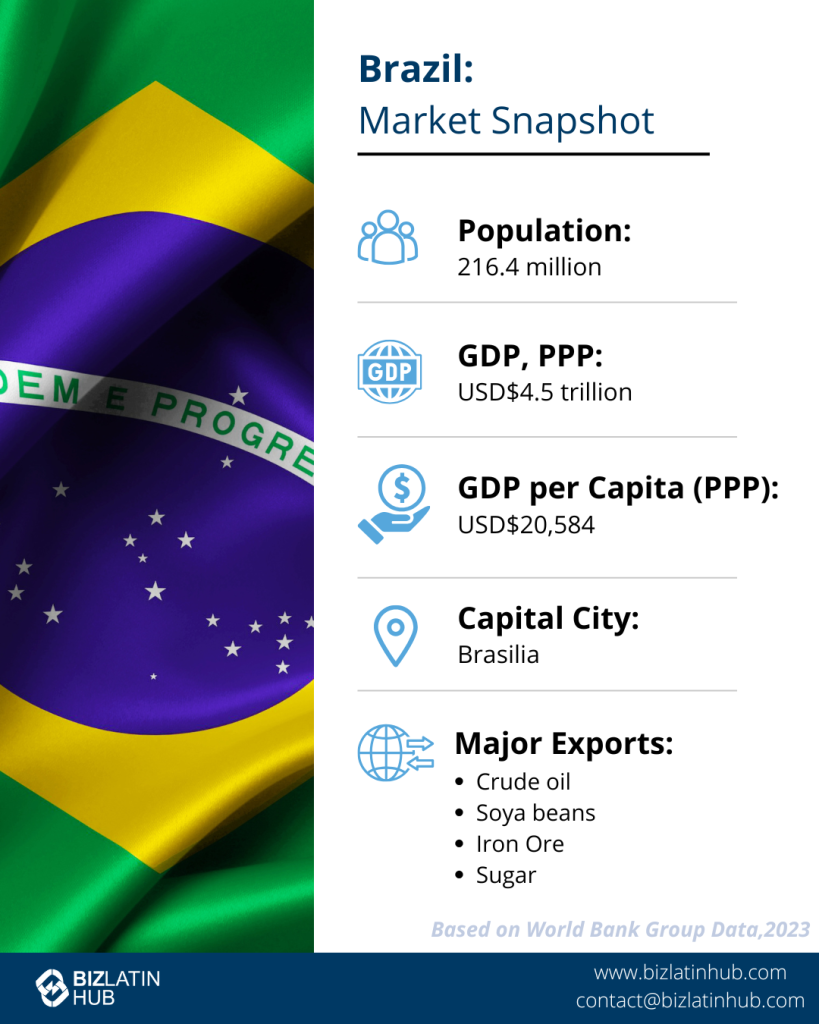
Sector-Specific Compliance Considerations
Manufacturing Companies
- IPI (Industrial Products Tax): Monthly obligations varying by product classification
- Environmental compliance: State-level licensing and emission monitoring
- Import documentation: SISCOMEX system integration for international suppliers
Technology and Software Companies
- Software taxation complexity: Different rates for licensed vs. developed software
- Digital service regulations: Municipal ISS compliance for cloud services
- Data protection: LGPD (Brazilian GDPR) compliance requirements
Service Providers
- Municipal ISS variations: Service location vs. company location taxation
- Cross-municipal operations: Multiple registration requirements
- Professional service regulations: Industry-specific licensing requirements
Import/Export Businesses
- SISCOMEX compliance: Integrated foreign trade system obligations
- Customs documentation: Proper classification and duty payments
- Foreign exchange controls: Central Bank reporting for international transactions
Use local experts for your entity health check in Brazil
Investing in Brazil no doubt has enormous upside potential with its booming economy, strong infrastructure, business-friendly government, and cheap workforce; however, the price to pay for this comes in the form of compliance.
Large multinationals go through in-house compliance auditing every month. They simply cannot risk the penalties in fines nor reputation. Why should it be any different for smaller companies? Insulate yourself from corporate penalties by employing an entity health checker.
Biz Latin Hub provides a range of business services to in-coming foreign companies. Partner with our expert team of lawyers and accountants to help your company navigate local compliance law. If you’re interested in our Brazilian entity health checking services, get in touch today here at Biz Latin Hub and we can ensure your fiscal and legal requirements are clear of all noncompliance.
Learn more about our team and expert authors.






